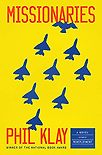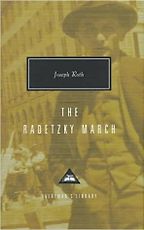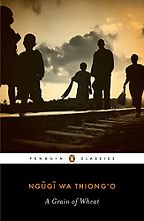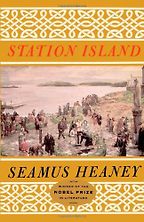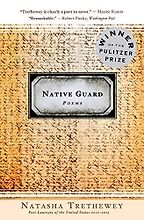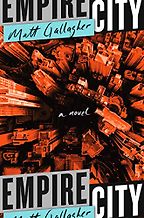On the eleventh day of the eleventh month, the world remembers those who served in war. You were a Marine and now you write about war and its aftermath. Why do you think remembering those who serve is important for people and polities?
The stories we tell ourselves about war are key to understanding who we are. Even though it happens outside of the view of the average American, war is a huge part of America’s identity.
War is something that we do collectively, but veterans feel the moral weight of war most viscerally. It’s important for society to acknowledge that and to have times when they think about what their own obligations ought to be in relationship to society.
More broadly, we memorialize historical events which involve violence and pain and courage and comradery and sacrifice, because these events and experiences tells us a lot about who we are as human beings.
A quote from Seamus Heaney’s poetry, “report us fairly, how we slaughter for the common good,” begins your brilliant new novel, Missionaries. What does that epigraph mean to you?
“Kinship” is such a good poem. The speaker is addressing Tacitus, talking about the Roman Empire. One of the goals of my book was to consider the reach of American power, the role that it plays throughout the world, the way that it reshapes societies far beyond our borders through the use of violent force. And I wanted to do that fairly but with an awareness about what assertion of America’s power entails. The use of the word slaughter, in the poem, jars. So I thought that those lines had all the right resonances for the beginning of my book.
In 2014 you received the National Book Award for your short story collection, Redeployment. What will veterans and those who rely on their service—all of us—get out of reading that book?
Redeployment emerged out of my attempt, after coming back from Iraq, to figure out what the hell I had experienced, what the hell people around me had experienced and America’s relationship to what we’d experienced. After I started writing, the wars continued. I was comfortably in New York as terrible things sometimes happened to people who I had served with overseas. These stories are my attempt to figure out what that tells us about what it means to be an American at this time in history.
The intensity of war puts people’s values to the test. Redeployment was a way for me to explore that process through the lives of twelve different characters.
Turning to books by others, your first choice is by one of my favorite authors. Please tell us about Joseph Roth’s The Radetzky March.
The Radetzky March is about three generations of a family set during the twilight of the Austro-Hungarian Empire. The first soldier in the Trotta family saves the Emperor Franz Joseph during battle and is elevated to nobility, but by the time we get to his grandson and the brink of World War I, the family is much diminished. It’s not so much about war as it is about the ways in which the family has been shaped by its relationship with the military and its relationship with a fading empire. It’s so brilliantly written.
Does Roth’s portrayal of the plight of third-generation military members resonate with you because of your family’s long tradition of public service?
I’m not from a military family. My maternal grandfather was a diplomat, my dad was in the Peace Corps and my mother worked in international medical aid in various capacities. One of my brothers joined the Marines and one joined the Army. The military is increasingly a family business, which is something that worries me. You don’t want to have a warrior caste separate from the rest of American society.
Perhaps because so few people have a direct connection to military service, we tend to put veterans on a pedestal, to consider them personifications of patriotism. Or, on the other hand, to assume that they’re damaged. These contrasting but prevailing views of veterans are corrosive. Take the Navy Seal who claimed to have shot Osama Bin Laden. He tweeted, in the wake of President Trump’s defeat at the polls, “I cannot believe we invaded Iraq for these…people,” projecting the idea that citizens should follow veterans’ political lead.
“Veterans don’t deploy themselves. Veterans are sent to war by governments that answer, to varying degrees, to their citizenry”
In his Farewell Orders, George Washington told the Continental Army “it is earnestly recommended to all the troops that … they should carry with them into civil society the most conciliating dispositions, and that they should prove themselves not less virtuous and useful as citizens, than they have been persevering and victorious as soldiers.” That sense that we are all citizens and that we all must take part in the work of citizenship becomes attenuated when there is a warrior caste that is set apart and fetishized.
Next you’ve named A Grain of Wheat by much-honored Kenyan author Ngũgĩ wa Thiong’o.
It’s a novel about Kenya on the verge of independence with a rich cast of characters, from people who fought for independence to people who collaborated with the British colonialists. It’s about the legacy of violence, the intersection of public and private memory regarding conflict. It’s about how we commemorate war and how the celebration of war can be at odds with the experience of veterans. It’s about the possibility of redemption and moving forward from war. At the end of A Grain of Wheat, one character who was embroiled in conflict with another of them says to the other: “What has passed between us is too much to be passed over in a sentence. We need to talk, to open our hearts to one another, examine them, and then together plan the future we want.” So, in those characters’ words, Ngũgĩ wa Thiong’o explains to the reader why we need to talk about these things, because it’s humanly essential to those who carry the legacy of conflict inside their hearts.
You’ve named books about conflicts in Africa, Europe, North America and South America. Do you think comparative reading about conflict is healthy for veterans and citizens?
Absolutely. There’s so much great writing about war from Africa, from South America, from Asia. And you get different perspectives. Because we hadn’t had wars in our own homeland for 150 years, Americans have a limited sense of the way that people experience war. In wa Thiong’o, in Heaney, you don’t just have war as experienced by combatants, but also by communities. Americans write about war as something you send people off from the community to fight far away. So authors from other countries are not just writing great works of literature, they’re also providing a richer picture of war.
Seamus Heaney’s Station Island is your next selection.
Seamus Heaney’s poetry is so magnificent it’s difficult to do it justice. He engaged with politics and with the violence of the Irish struggle in a complex way. He says the poet is “stretched between politics and transcendence.” In Station Island he goes back to his roots to look at his communal ties, his early beliefs and the dead of his past. In the center of the Station Island sequence, the speaker is visited by ghosts, some literary, some with a personal connection to him, some of the dead who died in the violence. It’s Heaney accounting for who he is in the midst of this violent political struggle, in the midst of complex cultural currents. “Easy now”, one ghost, with his forehead blown open, tells him, “it’s only me. You’ve seen men as raw after a football match.”
He tells one ghost, “Forgive the way I have lived indifferent.” In a previous book, he memorialized a cousin who had been killed in a sectarian assassination. Here the cousin’s ghost confronts him. It’s a line I think of often as I write about violence. His cousin says, “You saw that, and you wrote that — not the fact. /You confused evasion and artistic tact. /The Protestant who shot me through the head /I accuse directly, but indirectly, you /who now atone perhaps upon this bed /for the way you whitewashed ugliness and drew /the lovely blinds of the Purgatorio /and saccharined my death with morning dew.” It’s an astoundingly thoughtful and beautiful meditation.
Get the weekly Five Books newsletter
So, why is this a book that I would want veterans to read? Because it offers so much for somebody trying to move forward in the aftermath of violence. Heaney confronts his complicity, confronts his guilt, confronts the dead and what he owes to them. For veterans, in the current era, all of the things that he’s confronting are very much alive and present. When I read it, it felt like a revelation.
Next please tell me about Natasha Trethewey’s Native Guard.
The title refers to one of the first Black units in the Civil War. They’d been stationed at a fort not far from where Trethewey grew up, but their memory had been effaced, as so often happens with Black history. Some of the poems center specifically on that unit. There’s one in which a former slave, among the Guard the title refers to, says, “I’ve reached thirty-three with history of one younger inscribed upon my back. I now use ink to keep record, a closed book, not the lure of memory – flawed, changeful – that dulls the lash for the master, sharpens it for the slave.”
“You don’t want to have a warrior caste separate from the rest of American society”
Even the poems that are not directly about the war revolve around grief, around memory or around what can be recovered and reconsecrated. In the opening of a poem in the collection called “Theories of Time and Space” Trethewey writes, “you can get there from here, but there’s no going home everywhere you go will be somewhere you’ve never been.” So Tretheway is balancing the weight of history with the need to go forward. It’s an exceptional collection about the intersection of personal and public history. And it’s just a wonderful book of poems.
War-induced psychological trauma has been a topic of literature since Herodotus. I know Tretheway writes in that tradition and also in the shadow of the fact that her stepfather was a veteran who suffered from PTSD and who tragically murdered Tretheway’s mother. I know that writing is something used as a therapy for veterans suffering from post-traumatic stress disorder. I wonder if you recommend reading for therapeutic reasons too.
All of these books are about how violence, memory, history, and trauma can haunt us. So, yes.
Moving on to Matt Gallagher’s Empire City, please tell me about it.
This is a great book, set in a world where America won the Vietnam War, a world where the chastening lessons America learned from its failure in Vietnam were never learned. It’s a world where America is unabashed about empire and where a military caste plays a huge role in politics; all the main characters have served in wars and are involved in domestic politics. The contentious and troublesome election of 2020 could’ve been conjured into existence by Matt Gallagher, if it hadn’t been conjured by Donald Trump. The novel traces all the ways in which American fascination with our military might and violence play out across different political movements and institutions.
Five Books interviews are expensive to produce. If you're enjoying this interview, please support us by donating a small amount.
It’s also really fun. The central characters are veterans who have comic book-style superpowers. It’s a totally wild yet incredibly well thought-out and insanely believable picture of a cracked America. And it’s way too close for comfort.
Is there anything about the alternative reality genre that delivers something about the experience of veterans which realist lit can’t?
This is a good question. I think that alternative histories, by presenting a somewhat cracked vision of reality, allow us to see ourselves more closely. So it’s a fun house mirror that helps us realize how distorted our reality has become. It allows readers to get a distance from current difficulties, which makes it feel safe to see what’s wrong, and then realize how uncomfortably close this alternative reality is to the one that we’re living in.
In fiction and essays, you’ve written about what it feels like to be on the receiving end of the trite things that civilians like myself say such as, ‘thank you for your service’ and ‘I can’t imagine what you’ve been through.’ Why is it so important for people who’ve never been to war or worried about a friend or family member at war to imagine what veterans go through?
It might seem deferential to say to a veteran, ‘I can’t imagine what you’ve been through.’ We assume, I think wrongly, that there is an unbridgeable gulf between those who have served in the military and those who haven’t. These books can help bridge that gap. I want my writing to bridge that gap. We all have a responsibility to try.
It’s important for people to try to imagine what veterans go through because we all bear responsibility for war. Veterans don’t deploy themselves. Veterans are sent to war by governments that answer, to varying degrees, to their citizenry. How citizens understand the violence that is done in their name affects a nation’s willingness to wage war and veterans’ reintegration into the society they serve.
Interview by Eve Gerber
November 11, 2020. Updated: September 13, 2021
Five Books aims to keep its book recommendations and interviews up to date. If you are the interviewee and would like to update your choice of books (or even just what you say about them) please email us at [email protected]

